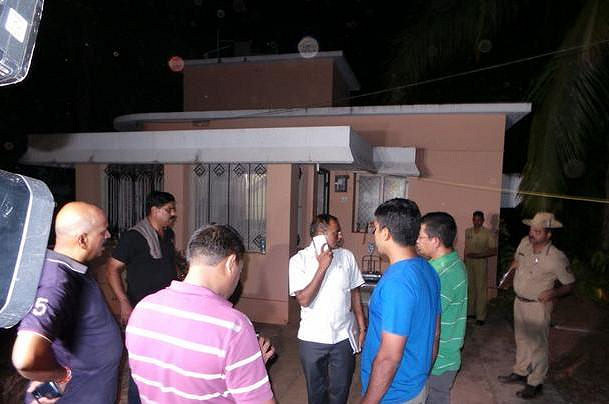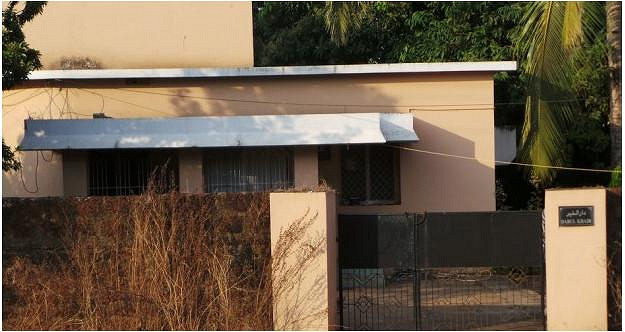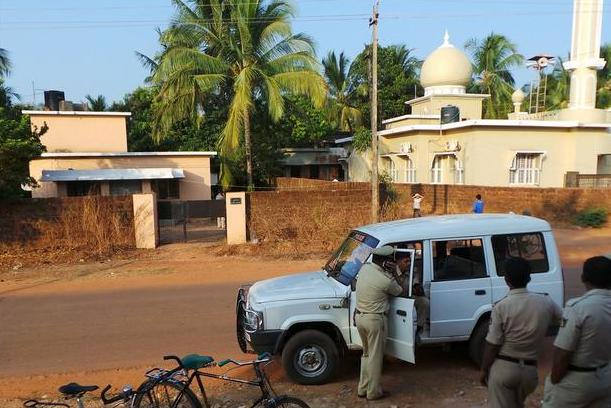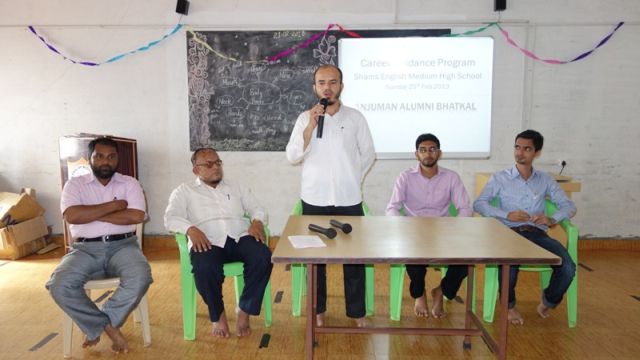While Shabbir Gangauli’s acquittal is a case of justice delivered albeit after nine years of torture, there are many Bhatkal residents who continue to languish in jail. Four such people were arrested over four days in the second week of January 2015. However, as locals allege, these arrests reek of conspiracy and are shrouded in controversies. In the second of the nine-part series, Amit Kumar meets the family and friends of one of the arrested, Syed Afaq Lanka, and investigates why his arrested came as such a shock to the residents of Bhatkal.
On January 7, 2015, 35-year-old Syed Ismael Afaq Lanka walked into the office of the Karnataka Information Commission in Bangalore regarding an RTI that he had filed. A homoeopathic doctor by profession, Lanka had been trying to follow up on an issue related to his hometown of Bhatkal. He met the concerned authorities and went home. Lanka was well-known for his social work and his medical work back home, even though he had moved to Bangalore with his wife, kids and parents a year ago.
A day later, at, the Bangalore Police announced that Afaq and his cousin Abdus had been arrested from Bangalore. Both of them were identified as Indian Mujahideen operatives who were the main suppliers of explosives for blasts across the country and were said to be close to Reyaz Shahbandri alias Reyaz Bhatkal. But as is often the case with these arrests, there is more than what meets the eye.

Imran Lanka, the brother of Afaq, was heading to his office in Bhatkal that day when he got a call. His mother was on the line and sounded extremely worried. “She said that their house in Bangalore was being raided by the police. I told her to calm down,” Imran says. The raid yielded nothing and the only ‘objectionable’ material they found out was two books, one of which was ‘Who killed Karkare?’, he added. But more worryingly, the police asked for Afaq and his number was switched off when his mother tried calling him. He had an appointment at a local acupressure clinic but he never made it.
Before Imran could take a stock of things, he received a call from the Circle Inspector in Bhatkal and was told that his house in Bhatkal is also being raided. “I asked the officer to wait until I was there so that the search is conducted in my presence,” Imran, who is a lawyer and hence well aware of his rights, told TwoCircles.net. “They turned the house upside down, but found nothing,” he added.

But the trouble was far from over. Nearly the same time, around 2 pm, as Imran’s house was being raided, another team in Bhatkal was raiding his cousin Abdus Suboor’s house. “I got a call saying there are about 7-8 Jeeps outside the house and no one is being allowed to get close.” By the time Imran reached the spot, the police had been inside the house for over an hour. “My cousin Abdus and his family used to stay here, but since Abdus was in Bangalore and his parents were in Kerala for treatment, the house had remained locked for over a month. They broke into the house without permission. When they could wait outside my house before raiding, why couldn’t they do so in this case too?” Imran asks.
The events of that day, as confirmed by the local journalists who were present at the spot, indicate that the police walked inside the house with bags and when Imran went inside, he was showed the material that had been seized. “I was shown some material that could be used to make bombs: gelatin sticks, some dynamite and told that this was found in the house,” says Imran. The official version says that around 5 kg of ammonium nitrate, gelatin, electrical circuits, detonators and a walkie-talkie were seized from the house.

However, one local Kannada journalist who arrived outside the house just moments after the police’s arrival, says that two things that the police did make the whole event extremely suspicious. “One, they never showed the local media what they had seized. We kept asking them but they only told us they had seized gelatin sticks and other material used for making bombs. They showed us bags, but not the content inside. Why? Also, all the material were inside a green-coloured bag. Did they find it that way, or did they pack the material themselves? We were never told,” he says.
Second, when they were leaving, they were ‘in custody’ of one person whose face was covered. We initially thought they arrested Abdus who was inside the house. But the house was locked from outside. We thought it was some other person who had been arrested,” he said.
Interestingly, even as the police was wrapping up the ‘raid’, news channels began flashing reports that a large haul of explosives had been recovered from Bhatkal, even though no one had actually seen any evidence, says the local journalist. The Bangalore Police confirmed that two people had been arrested from Bangalore for allegedly having links with Indian Mujahideen. Then who was arrested from Bhatkal and carried from the house? “Must be a cop himself,” said the Kannada journalist. “Don’t laugh,” he says, chiding me. “We confirmed it with the police and they agreed. They said it was a local police officer who was being shielded from any possible repercussions.”
The third person to be arrested in this case that night was a younger brother of Imran and Afaq, but he was released after two days. However, while the police arrested the other two, they remained unsure as to which blast were they responsible for. In the initial days, as media reports suggest, the two were said to be involved in Dilkhushnagar blasts in Hyderabad. Two days later, they were said to be involved in December attack in Church street, Bangalore. Finally, after six months of arrest, the two were held responsible for the 2011 blasts in Zaveri Bazaar in Mumbai, 2008 Barakhamba Road in Delhi along with being charged under Sections of Arms and Explosive Acts.
Earlier in the morning, Saddam Hussein, a scrap dealer had been arrested from Bhatkal although his family allege that he was in fact, kidnapped from Jali Beach Road. On January 11, Reyaz Ahmed Sayeedi was arrested when he was trying to board his flight from Mangalore to Dubai where he worked. Interestingly, Hussein remains the only person who has been arrested from Bhatkal in all these years. His story will be told in part three of this nine-part series.
RTI activist, journalist who was always ready to help people
It will not be wrong to say that over the past decade, Bhatkalis have seen quite a few of their own getting arrested on terror charges. However, the arrest of Lanka came as a shock to many locals. “He was always there to help people. In fact, his RTIs had come to the aid of locals on more than one occasion. In 2014, three minor youths were detained by the Bhatkal police and beaten mercilessly while in Police custody. It was Afaq who took up this matter and wrote to the Lokayukta to take action against the erring officials, following which an investigation was conducted and three police officials were demoted and transferred,” said a neighbour of Afaq who has known him for a long time.

In December 2013, Afaq also exposed the loopholes in the allotment of visa at the Bangalore FRRO office by doing a sting operation, which was broadcast on Kannada news channel Kasturi News. Afaq had married a Nawayath girl from Karachi, Pakistan in 2006 and the couple had been facing issues regarding Visa even though Afaq’s wife met all the requirements. “The Police used his marriage to a Pakistani to implicate him by saying that he was anti-India. Nothing can be further from truth. It is not uncommon for marriages to take place between Nawayaths from India and Pakistan,” said Faizan, another local who knew the Lanka family. He used to address students regularly, as this report from a local website shows, and was always ready to help people. In fact, when Moulavi Shabbir Gangauli was arrested in 2008 for similar charges (and subsequently acquitted in 2017), Afaq was one of the first to help his family.
30 months after arrest, trial yet to begin
One of the most common links between these terror arrests is that while the police are ever enthusiastic about arresting people, they almost never show the same enthusiasm when it comes to putting them on trial. Last month when we interviewed Yahya Kammukutty, another person who was labelled a terrorist before walking out free after 7 years, he too had said that while his charge sheet was prepared in April 2008, the trial did not begin until November 2010. The same is happening in this case too. Imran says that trial is yet to begin in either the Mumbai or the Delhi or even the Arms case in Bangalore. “We have been waiting, but there seems to be little or no progress in this matter,” he says. A supreme Court lawyer told TwoCircles.net, “These instances are very common. Unfortunately, the accused cannot do much except apply for bail but even that is unlikely in cases of terrorism. They have no option but to wait.”
Then, there is the issue of which law is applicable in the case of Afaq. The Maharashtra ATS wants to pursue Afaq under both MCOCA and UAPA, a position that Imran considers impossible. “You can either be tried under MCOCA or UAPA, not both. Also, for MCOCA to be applicable, the person should have previously been charged in a prior case in Maharashtra, which is not the case here as Afaq has no prior cases of any sort in Maharashtra or elsewhere,” he says. But more than anything else, it is the lack of progress that is frustrating the family of Afaq. “We feel the pain everyday but what can we do? The crime or innocence of a person depends on an honest and a fair trial. Here, the trial has not even begun after all these years,” says Imran. As a lawyer, he has been closely monitoring the cases and knows that there is every chance that the family is in for a long haul. “We have no other option but hope,” says Imran. For a number of families in Bhatkal, hope is all they have now.


